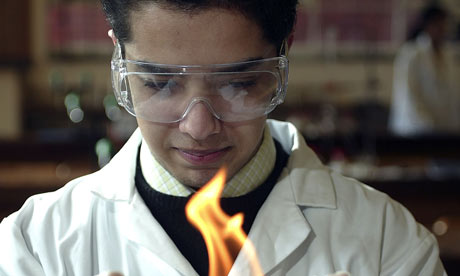Geology is gaining popularity in line with the growth in the demand for fossil fuel and discovery of new reserves.
Fast Facts
Best Schools: Delhi University, Banaras Hindu University, Jadavpur University, University of Madras, Ranchi University.
Qualification: BSc, MSc in Geology
What you become: Marine geologist, Petrologist, Mineralogist, Geohydrologist, Hydrologist, Paleontologist, Seismologist
Recruiters: Geological Survey of India, Central Ground Water Board, ONGC, Bharat Petroleum Corporation Limited, Mineral Exploration Authority, Indian Space Research Organisation
How do mountains rise? How are rocks created and destroyed? These questions can be answered if we study Geology, a field-oriented, scientific discipline, which investigates the properties of the earth, its substances, shapes, processes and history. Geology is a multi-disciplinary subject, which includes study of minerals (mineralogy), rocks (petrology), the structure of the Earth (structural geology), volcanic phenomena (volcanology), landforms and the processes that produce them (geomorphology and glaciology), study of fossils (paleontology), the development of sedimentary strata (stratigraphy) and the evolution of planetary bodies and their satellites (astrogeology).
By studying the history, composition, changes that occur on the earth, geologists foresee how events, processes of the past influence the future, says Prof. Mallickrarjun Joshi, Professor, Department of Geology, Benaras Hindu University (BHU). A geology class all starts with rocks and minerals, which are not just stones but stories. For instance, the knowledge on the age of the rock would help a student of geology to identify the type of mineral. The study of rocks, minerals, mountains, earthquakes, volcanoes, rivers, glaciers, landslides and floods fall into this broad field.
What a geologist does
A geologist’s job involves two main functions: Exploration and Research. Exploration: Involves detailed identification of structures (mountains, rivers, rocks), investigation of the resources of a region (drilling into the ground to locate water, mineral, energy resources), predict future geologic hazards like earthquakes, floods, landslide.
Research: Compiles the data into a geological map, which shows the distribution and relationship of the properties. It is supplemented by laboratory investigation, where a geologist uses microscopic, electronic equipment and computing techniques to analyse samples collected from the field. After the analysis (which includes calculations) a geologist prepares a report.
A geologist’s work significantly includes - field activity, office-based data processing, report writing and project planning. The scope of the job depends on the work area of the company or organization, you work for. For instance, Pranjal who works as a Geologist with ONGC’s Oil Exploratory Division in Gujarat monitors the oil wells to locate how much oil can be extracted for developing process.
According to Soma Sengupta, Senior Advisor (Geology) at Directorate General of Hydrocarbons, majority of the geologists working in the petroleum and oil industries are involved in both exploratory and laboratory work. “Working in the field may mean spending long hours outdoors, doing exploration, surveying and production,” she said.
Entering the field
To kickstart your career as a geologist you must have completed an MSc in Geology. Most universities across the country offer a Bachelor’s, Master’s and PhDs in Geology. You must have completed 10+2 in Science to enrol for a BSc in Geology.
“A Master’s degree is enough for any entry-level positions. But an advanced degree like PhD will help you enter colleges to teach,” says Joshi.
BSc
A BSc focuses on the basic concepts of Petroleum Geology, Marine Geology etc.
MSc
It comprises both pure and applied geology, which focuses on the advanced learning of the fields. It builds upon the foundation laid during a BSc, by building a strong theoretical and practical framework. Writing a dissertation is one of the general requirements. According to Amit Sarma who works in the petroleum industry as a geologist in Noida, the theory learnt during his MSc helped him to put concepts into practice.
Further specialisation
After MSc, one can also opt for MSc (Tech)/MTech for specialisation in Geotechnical and Geo-environmental engineering etc., which are parts of Civil Engineering field. In order to be eligible, one must have a GATE score.
An added advantage for these students is that all institutes offer scholarships of at least Rs. 8,000 per month with a contingency fund of Rs. 10,000 per annum. Due to the increase in the demand of oil and natural gas and also because of new findings of reserves, the most recent trend spotted in many colleges is the rush towards taking up MSc Petroleum Geology/MTech Petroleum Exploration.
Qualities required for the job
* Ability to visualise
* Good scientific/technical skills
* Audacious as an explorer
* Physical fitness
* Ability to interpret statistical and graphical information
* Attention to detail
* Report-writing skills
Field trips
Since geology is related to environment, a large portion is taught outdoors. So, field work becomes an integral part of all degree programmes. It may include collection of geologic data, constructing a measured section, interpreting geologic structures and geologic mapping.
Geology and the environment
Geologists have an important role in preserving and keeping the environment clean as they assess natural disasters and its effects. Their activities include - monitoring waste disposal sites, preserving water supplies and minimising the threat to communities at risk from geologic hazards like earthquakes, landslides, volcanoes and tsunamis. Geological maps are important inputs for the generation of hazard maps. It helps the mitigation team to engage in disaster management in an efficient manner.
Geology meets engineering Geologists play an inevitable role in engineering projects. The meeting point of engineers and geologist is in the irrigation, nuclear power and communication projects like bridges, tunnels, roads etc. Every civil engineer has to get well-equipped with geology. According to Dr K.S Rao, Professor, IIT, Delhi, there is a wide application of geological principles in the areas like Geotechnical & Geoenvironmental, Hydraulics, Structure and Transportation Engineering. Prior to any building construction, an engineer has to determine the properties of soil. “To determine the stability of the structure, the engineers work closely with geologists to identify the type of bedrock at building sites,” he stressed.
Opportunities galore
Geology prepares you to be part of varied areas, right from resource management and environmental protection to mineral and oil exploration.
They can specialise in innumerable fields. A geologist can work in engineering and consulting firms, government agencies, mining companies, petroleum companies, museums. The UPSC conducts exams for placement in GSI, Central Ground Water Board etc. They also have an option to take up IAS/Forestry Service. PSUs like ONGC, Hindustan Zinc Ltd conducts All India Entrance exam for hiring Geologists.
With an advanced degree, a geologist will qualify for supervisory/ research/ teaching positions through NET in Universities or institutes.
Demand for geologists often mirror the price of geological commodities such as fuels, metals and construction materials. As rise in international oil price directly relates to Geology. The oil companies become more viable for exploration and this creates a major demand for Geologists in the market.
Kinds of geologists
Marine Geologist
Studies marine environment. With the help of remote sensing they locate old rocks and vegetations and effects on sea and atmosphere.
Petrologist
Conducts explorations for new oil and gas fields both the onshore and offshore activity. All types of survey like geophysical and seismic surveys are carried out before drilling.
Mineralogist
Identifies useful mineral in rocks and sea beds. It’s mostly work in the underground.
Geohydrologist
Locates and assesses sources of water and also find threats which can pollute the water.
Hydrologist
Studies underground sources of water and all related parameters to it like infiltration and pollution threats.
Paleontologist
Works with fossils (dead remain of creatures and plants). They estimate their age and try to find how the earth was at that time and what lead to their deaths.
Seismologist
Works with movement of Earth’s tectonic plates, which causes earthquakes.
Surveyor
Collects data about land and sea and maintain a database and keep monitoring the changes in data with past and present values.
They hire geologists
* Geological Survey of India (GSI)
* Central Ground Water Board (CGWB)
* Directorate of Geology and Mining (DGM)
* Indian Bureau of Mines (IBM)
* Defense Research and Development Organisation (DRDO)
* Indian Space Research Organisation (ISRO)
* National Geophysical Institute (NGRI)
* Wadia Institute of Himalayan Geology, Dehradun
* Bhabha Atomic Research Centre (BARC)
Public Sector Undertakings * Oil & Natural Gas Corporation Ltd. (ONGC)
* National Hydro Power Corporation (NHPC)
* National Thermal Power Corporation (NTPC)
* Minerals and Metals Trading Corporation (MMTC)
* National Remote Sensing Agency (NRSA)
* State Mining Corporation (SMC)
* National Mineral Development Corporation (NMDC)
* NALCO
* Hindustan Zinc Limited
* Bharat Petroleum Corporation Limited (BPCL)
* Theri Hydro Development Corporation (THDC)
* Mineral Exploration Authority Private sector companies
* Broken Hill
* Rio Tinot
* De Beers
* Cairn Energy
* Reliance Energy
* Shell
* Service providers - Schlumberger, HLS
Money talk
Government jobs (GSI, CGWB) offers you a decent living style, while public sector (ONGC, HPCL, IOC ) offers handsome salary with good perks and better working conditions.
In both the private and public sector, a fresher with an MSc in Geology can expect a salary between Rs. 25,000-38,000. It will vary also based on the location of your work (metropolitan cities, areas prone to harsh weather conditions etc).
Opportunities abroad Besides the USA, Australia, Canada, the need for geologists is rising in developing countries. Indonesia, Malaysia, Saudi Arabia, UAE, Kuwait, India, Vietnam, Thailand, Afghanistan, Bangladesh and Pakistan require geologists for civil works such as the construction of highways, airports, dams, pipelines etc. “The Middle East, the goldmine for oil, is a paradise for geologists,” says Amit.
The flipside As a field geologist you may be placed in situations that will test you in every possible way. Be prepared to work in remote terrains and travel widely as project requirements dictate. There are instances when you might get dehydrated or injured, and most of the time you are not close to the city where you can get aid. Also, working in vulnerable areas (earthquake, flood prone) could be dangerous if he/she is not prepared for it. A geologist has to cope with potential problems which may occur during the construction of tunnels, dams and other gigantic projects. In the tunnels, inaccessibility to proper ventilation, radio connections, traffic lights would lead to accidents.
Filling the jobs in offshore oil fields is proving to be a major challenge. There are several reasons for reluctance: Not many people are willing to live in the middle of the ocean on an oil rig, extremes of temperature - either extremely cold (most deep ocean oil rigs) or extremely hot, sometimes both. If all these pitfalls do not scare you too much, then the field becons you with open arms.
source :
http://in.education.yahoo.com/news/yeducareers360/geology-career-outdoor-enthusiasts-20110131



